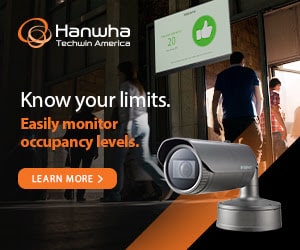It is no exaggeration to say the pandemic has disrupted nearly everything in retail, and it’s clear now that many changes will persist or become permanent. It’s starting to settle in that what was hoped might be a short detour for the industry now seems like an entirely new direction.

Little about retail and loss prevention has been untouched, explains Jordan Rivchun, a former director of loss prevention with 15 years of LP experience who now leads retail solutions and strategy for Hanwha Techwin America. Fundamentally, Rivchun says the pandemic has altered customer expectations, which in turn is forcing retailers and employees to re-write strategies for providing customer service and operating safely in the new normal.
And these strategic shifts are on top of more rudimentary—but no less impactful—modifications, like the new home office. “When I talk to directors of AP and others in the corporate office, you can tell that one of the hardest adjustments for a lot of these leaders has been getting accustomed to working remotely while still remaining connected to their home office business partners,” he said. It has been no small feat for LP leaders to maintain visibility and their grasp of operations from an entirely new vantage point.
Technology is helping, but Rivchun believes vendors can do a better job of helping LP leaders meet the moment. “More than anything, solutions providers need to listen and understand specifically what the customer is asking for,” he said. “A lot of providers are throwing stuff at the wall to see what might stick, but often the problems retailers are having don’t match the sales pitches they’re getting. Now is the time to get educated on LP’s current challenges and to develop support and resources to help with those challenges.”
Among them, Rivchun explained, is the need to leverage video more effectively: to monitor stores, to drive operational efficiencies, and to effectively promote safety in the new normal. “It’s been widespread across retail segments, though first and perhaps most profoundly in grocery and other essentials—they were the quickest to adopt new technology, including a steady shift to more video.”
Indeed, while technology sales were expected to slow as retail recalibrated, many stores pivoted their resources to invest in tools to meet new challenges. “Demand has been unprecedented,” said Rivchun. “Our job as a manufacturer is to be aligned with the retail community and pivot our R&D resources based on what we’re hearing so we can deliver those solutions that are needed now.”
That investment has sparked a host of new tools that give retailers options for tackling the new issues they face. Hanwha, for example, released a new occupancy monitoring application and mask detection analytic for its P series AI cameras. Now, retailers can accurately detect and count people entering and exiting premises—a store, warehouse, or office—and dynamically display the current occupancy level for customers and staff. They can detect if mask requirements are being followed with alert options for violations that include customizable audio messages directly from the cameras. There has also been interest in elevated body temperature detection, noted Rivchun, with some retailers going the thermal camera route and others opting for less technical approaches. “These are all new decisions that have been facing AP teams, and HR and legal teams. These are not normal practices and they demand new approaches.”
It’s a good time, then, for much-hyped AI solutions to prove real-world value. Hanwha’s AI-based cameras can identify any number of issues—from a shopper’s sex to whether someone has wandered into a zone where they’re not permitted—but these impressive identification features and functionalities have transitioned from a “nice-to-have” to providing critical intelligence that is helping stores to protect lives and keep the economy afloat during a global health crisis. Critically, new functionalities can exist at the edge, which means intelligence features applied to meet COVID-related challenges can easily be directed at different problems down the road. “You’re buying a capability that will outlast the crisis,” said Rivchun.
Edge intelligence “gives end-users peace of mind that the technology needed today to meet this critical moment is not an act of planned obsolescence,” explained Rivchun. Via new camera chipset technology, the same intelligence that lets cameras recognize a face mask can be aimed at whatever recognition needs arise in the future. Updates and the ability to flash the firmware—overwriting existing firmware with new data—permits new algorithms for addressing strategic imperatives as they change. Radiometric thermal cameras, which can look for elevated body temperatures, can be deployed to alert if a server runs too hot. Technology is helping LP weather the current crisis, “but you’re also readying yourself for scenarios that don’t even exist today.”
AI is also proving its worth through enhanced forensic video searches, something Rivchun has heard the need for during his frequent check-ins with customers. As retail operations have shifted, LP has been needing to focus tools in service of the new things they need to know. It’s especially critical as LP teams get stretched ever more thin and new ways to enhance productivity become necessary. “Video can be an effective deterrent, but even more than ever before, the ability to review and extract information from video quickly, with fewer resources, is critical,” he said.
The pandemic has exacted a severe toll both in economic damage and human lives, and it’s impossible to suggest a silver lining to the tragedy. But the crisis, by forcing retailers to pivot to meet new challenges, has injected flexibility into operational strategies. So, while COVID-19 has certainly backfooted retail and LP, it can also put them on better footing to adapt to future changes.
With intelligent cameras as a base, the addressing of current challenges starts to look more like an opportunity and less like crisis response. “These are not temporary solutions,” explained Hanwha’s Rivchun. “They are laying a foundation for future problem solving.”



